|
TRATTATI E CONVENZIONI INTERNAZIONALI
|
|
|
|
|
|
Indietro
|
|
CONVENTION FOR THE PROTECTION OF HUMAN RIGHTS AND FUNDAMENTAL FREEDOMS 4.XI.2000
|
|
CONVENTION FOR THE PROTECTION OF HUMAN RIGHTS AND FUNDAMENTAL FREEDOMS
|
| |
PROTOCOL No. 12
TO THE CONVENTION FOR THE PROTECTION OF HUMAN RIGHTS AND FUNDAMENTAL FREEDOMS
Rome, 4.XI.2000
2 ETS 177 – Convention for the Protection of Human Rights (Protocol No. 12), 4.XI.2000
The member States of the Council of Europe signatory hereto,
Having regard to the fundamental principle according to which all persons are equal before
the law and are entitled to the equal protection of the law;
Being resolved to take further steps to promote the equality of all persons through the
collective enforcement of a general prohibition of discrimination by means of the
Convention for the Protection of Human Rights and Fundamental Freedoms signed at Rome
on 4 November 1950 (hereinafter referred to as “the Convention”);
Reaffirming that the principle of non-discrimination does not prevent States Parties from
taking measures in order to promote full and effective equality, provided that there is an
objective and reasonable justification for those measures,
Have agreed as follows:
Article 1
General prohibition of discrimination
1. The enjoyment of any right set forth by law shall be secured without discrimination on any
ground such as sex, race, colour, language, religion, political or other opinion, national or
social origin, association with a national minority, property, birth or other status.
2. No one shall be discriminated against by any public authority on any ground such as those mentioned in paragraph 1.
Article 2
Territorial application
1. Any State may, at the time of signature or when depositing its instrument of ratification,
acceptance or approval, specify the territory or territories to which this Protocol shall apply.
2. Any State may at any later date, by a declaration addressed to the Secretary General of the
Council of Europe, extend the application of this Protocol to any other territory specified in
the declaration. In respect of such territory the Protocol shall enter into force on the first day
of the month following the expiration of a period of three months after the date of receipt by
the Secretary General of such declaration.
3. Any declaration made under the two preceding paragraphs may, in respect of any territory
specified in such declaration, be withdrawn or modified by a notification addressed to the
Secretary General of the Council of Europe. The withdrawal or modification shall become
effective on the first day of the month following the expiration of a period of three months
after the date of receipt of such notification by the Secretary General.
4. A declaration made in accordance with this article shall be deemed to have been made in
accordance with paragraph 1 of Article 56 of the Convention.
5. Any State which has made a declaration in accordance with paragraph 1 or 2 of this article
may at any time thereafter declare on behalf of one or more of the territories to which the declaration relates that it accepts the competence of the Court to receive applications from
individuals, non-governmental organisations or groups of individuals as provided by 3 ETS 177 – Convention for the Protection of Human Rights (Protocol No. 12), 4.XI.2000
Article 3
Relationship to the Convention
As between the States Parties, the provisions of Articles 1 and 2 of this Protocol shall be
regarded as additional articles to the Convention, and all the provisions of the Convention
shall apply accordingly.
Article 4
Signature and ratification
This Protocol shall be open for signature by member States of the Council of Europe which
have signed the Convention. It is subject to ratification, acceptance or approval. A member
State of the Council of Europe may not ratify, accept or approve this Protocol without
previously or simultaneously ratifying the Convention. Instruments of ratification,
acceptance or approval shall be deposited with the Secretary General of the Council of Europe.
Article 5
Entry into force
1. This Protocol shall enter into force on the first day of the month following the expiration of a
period of three months after the date on which ten member States of the Council of Europe
have expressed their consent to be bound by the Protocol in accordance with the provisions of Article 4.
2. In respect of any member State which subsequently expresses its consent to be bound by it,
the Protocol shall enter into force on the first day of the month following the expiration of a
period of three months after the date of the deposit of the instrument of ratification, acceptance or approval.
Article 6
Depositary functions
The Secretary General of the Council of Europe shall notify all the member States of the
Council of Europe of:
a any signature;
b the deposit of any instrument of ratification, acceptance or approval;
c any date of entry into force of this Protocol in accordance with Articles 2 and 5;
d any other act, notification or communication relating to this Protocol.
In witness whereof the undersigned, being duly authorised thereto, have signed this
Protocol.
Done at Rome, this 4th day of November 2000, in English and in French, both texts being equally authentic, in a single copy which shall be deposited in the archives of the Council of
Europe. The Secretary General of the Council of Europe shall transmit certified copies to
each member State of the Council of Europe.
|
|
|
|
|
|

STAMPA QUESTA PAGINA
|
|
|
|
|
|
| |
|
|
|
|
|
|
IL DUBBIO RAZIONALE E LA SUA PROGRESSIVA SCOMPARSA NEL GIUDIZIO PENALE
|
 |
Roma, 11 luglio 2022, in diretta facebook
11 luglio 2022in diretta facebookIntervengono:Avv. Antonino Galletti, Presidente del Consiglio dell'Ordine ...
|
 |
|
|
FORMAZIONE INTEGRATIVA IN MATERIA DI DIRITTO DELLE RELAZIONI FAMILIARI
|
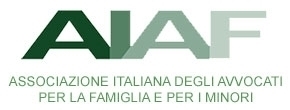 |
Milano, giovedì 15, 22, 29 settembre e 6 ottobre 2022, piattaforma Zoom meeting
4 incontrigiovedì 15, 22, 29 settembre e 6 ottobre 2022 dalle 14.30 alle 18.30 su piattaforma ZoomDestinatariMediatori ...
|
 |
|
|
XXXVI CONVEGNO ANNUALE DELL'ASSOCIAZIONE ITALIANA DEI COSTITUZIONALISTI “LINGUA LINGUAGGI DIRITTI”
|
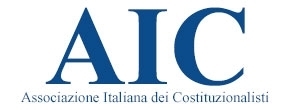 |
Messina e Taormina, giovedì 27, venerdì 28 e sabato 29 ottobre 2022
giovedì 27, venerdì 28 e sabato 29 ottobre 2022Università degli Studi di Messina, Aula Magna Rettorato, ...
|
 |
|
|
LA FORMAZIONE DELL’AVVOCATO DEI GENITORI NEI PROCEDIMENTI MINORILI E DI FAMIGLIA
|
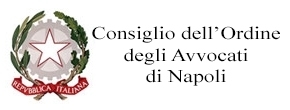 |
Napoli, 13 Ottobre 2022, Sala “A. Metafora”
Webinar su piattaforma CISCO WEBEX del Consiglio dell’Ordine degli Avvocati di Napoliore 15.00 - 18.00Giovedì ...
|
|
|
|
|
|

|
|
Diritto penale delle società
L. D. Cerqua, G. Canzio, L. Luparia, Cedam Editore, 2014
|
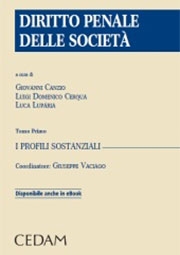 |
L'opera, articolata in due volumi, analizza approfonditamente i profili sostanziali e processuali del ...
|
 |
Trattato di procedura penale
G. Spangher, G. Dean, A. Scalfati, G. Garuti, L. Filippi, L. Kalb, UTET Giuridica
|
 |
A vent’anni dall’approvazione del nuovo Codice di Procedura Penale, tra vicende occasionali, riforme ...
|
 |
Formulario degli atti notarili 2014
A. Avanzini, L. Iberati, A. Lovato, UTET Giuridica, 2014
|
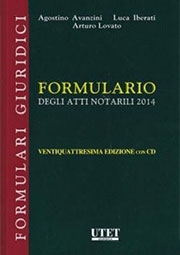 |
Il formulario soddisfa le esigenze pratiche del notaio, poiché consente di individuare, mediante una ...
|
 |
Manuale di diritto amministrativo 2014
F. Caringella, Dike Giuridica Editrice, 2014
|
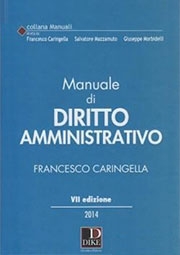 |
Nel corso dell'ultimo anno le incessanti fatiche della giurisprudenza hanno dato vitalità all'introduzione, ...
|
|
|
|
|
|
|
|
|
|
|
|
|